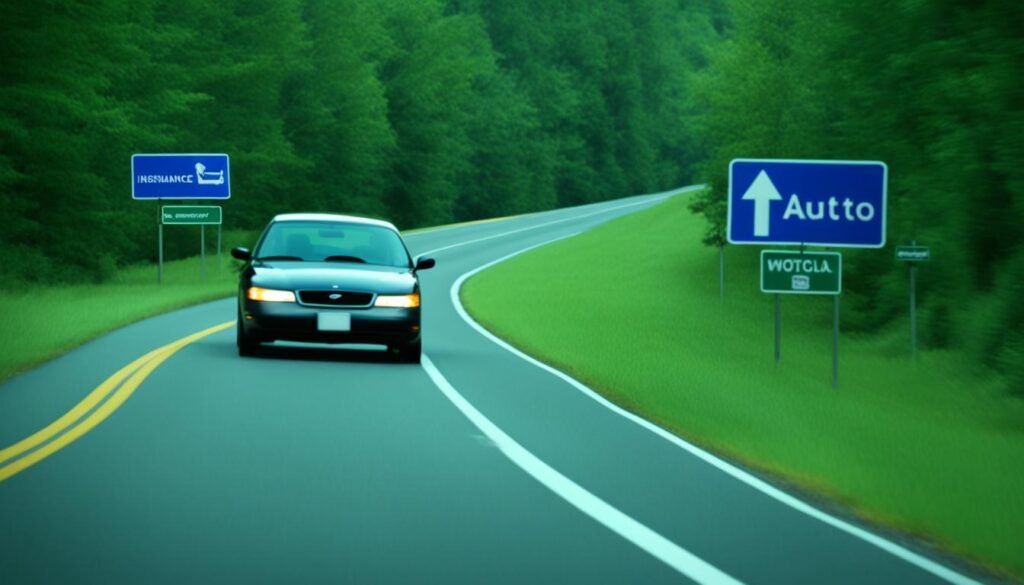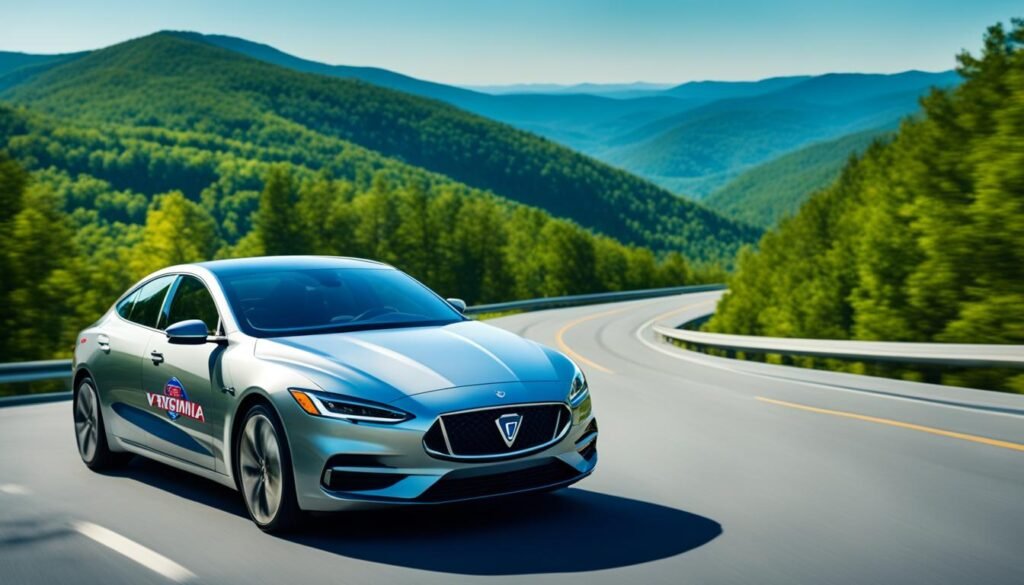Virginia drivers are lucky to have car insurance that’s cheaper than the national average, says Bankrate. The average cost for full coverage car insurance in Virginia is 30% lower than the national average. This makes insuring your vehicle here quite affordable.
But, it’s not just about the price. Customer service, financial stability, the range of coverage options, and how easy it is to use digital tools are also key. This article will help you find the best car insurance in Virginia. We’ll cover the top companies, what you need to know about state insurance laws, and how to get the cheapest rates.
Key Takeaways
- Car insurance in Virginia is generally much cheaper than the national average, with full coverage premiums 30% less.
- Factors like customer service, financial stability, coverage options, and digital tools are important when choosing an insurer.
- This article will cover the top car insurance companies, state requirements, coverage options, and tips to get the best rates.
- Virginia requires minimum liability limits of $30,000 per person, $60,000 per accident for bodily injury, and $20,000 for property damage.
- Uninsured/underinsured motorist coverage is also mandated by the state.
Top Car Insurance Companies in Virginia
Finding the best car insurance in Virginia can seem hard, but knowing the top insurers makes it easier. The top five companies are Geico, Progressive, State Farm, Travelers, and Nationwide, as Bankrate found.
Geico: Best for Digital Policy Management
Geico is a top pick for its great digital tools. Drivers in Virginia can easily manage their policies online or through their mobile app. It got a Bankrate Score of 4.4 out of 5, showing its strong position in the state.
State Farm: Best for Local Agents
If you like working with a local agent, State Farm is the best choice. They have many agents in Virginia, offering a personal touch to car insurance. They also have a lot of coverage options and discounts.
The best car insurance companies in Virginia offer many coverage options, discounts, and high customer satisfaction. Bankrate looked at average premiums, coverage options, discounts, and J.D. Power customer satisfaction ratings to rank them.

“The top five car insurance companies in Virginia are Geico, Progressive, State Farm, Travelers, and Nationwide, according to Bankrate’s analysis.”
How to Find the Best Car Insurance in Virginia
Finding the best car insurance in Virginia can seem tough, but it’s easier with some steps. Start by shopping around and comparing quotes from different providers. It’s smart to get quotes from at least three insurers to make sure you’re getting a good deal.
When looking at car insurance quotes, know what Virginia requires for auto insurance. You should also think about extra coverage if you have a car loan or lease. Virginia’s minimum auto insurance covers $30,000 per person and $60,000 per accident for injuries, and $20,000 for property damage.
Don’t forget to use discounts to save money. Many insurers give discounts for safe driving, having safety features in your car, or if you bundle your policies. This can help lower your insurance costs.
It’s also key to check how stable and customer-friendly the insurance companies are. This ensures you’re with a reliable provider who will help when you need them.
“The key to finding the best car insurance in Virginia is to shop around and compare quotes from multiple providers. Don’t settle for the first quote you receive – take the time to explore your options and find the coverage that best fits your needs and budget.”
By using these tips, drivers in Virginia can get the best car insurance to protect themselves and their cars on the roads.

Top Tips for Finding the Best Car Insurance in Virginia
- Compare quotes from at least three different insurance providers
- Understand Virginia’s minimum auto insurance requirements
- Look for available discounts to lower your rates
- Research the financial stability and customer satisfaction of insurers
- Consider coverage options beyond the state-mandated minimums
By following these steps and shopping around, Virginia drivers can find the best car insurance for their needs and budget.
Virginia Auto Insurance Requirements
Liability Coverage Minimums
Virginia requires drivers to have at least $30,000 in bodily injury liability coverage per person, $60,000 per accident, and $20,000 in property damage liability coverage. These levels will go up to 50/100/25 on or after January 1, 2025. Drivers can choose not to have liability insurance by paying a $500 Uninsured Motor Vehicle fee. But, they’ll have to pay for damages themselves if they cause an accident.
Virginia is one of the few states where auto liability insurance isn’t mandatory. But, drivers must always have proof of insurance in their car. The state’s minimum insurance includes $25,000 for bodily injury or death per person, $50,000 for two or more people, and $20,000 for property damage.
Drivers choosing the uninsured motor vehicle option pay a $500 annual fee. This lets them register their vehicle without insurance but makes them personally responsible for any accident damages. Most experts suggest getting higher insurance limits for better financial safety.
| Coverage Type | Current Minimum | Upcoming Minimum (2025) |
|---|---|---|
| Bodily Injury Liability (per person) | $30,000 | $50,000 |
| Bodily Injury Liability (per accident) | $60,000 | $100,000 |
| Property Damage Liability | $20,000 | $25,000 |
By knowing Virginia’s auto insurance rules, drivers can make sure they’re covered. It’s key for both new and experienced drivers in the state to check their policies. This helps them find the best coverage for their needs.

The Cost of Car Insurance in Virginia
In Virginia, car insurance rates are often lower than the national average. A 35-year-old driver with a clean record and good credit pays about $1,142 a year or $95 a month for full coverage. This is 34% less than the national average of $1,730 a year.
For minimum coverage, the cost drops to around $490 a year or $41 a month. This is 23% less than the national average of $635 a year. Virginia is considered one of the more budget-friendly states for car insurance.
| Coverage Level | Virginia Average | National Average | Savings |
|---|---|---|---|
| Full Coverage | $1,142 per year | $1,730 per year | 34% cheaper |
| Minimum Coverage | $490 per year | $635 per year | 23% cheaper |
The cost of car insurance in Virginia depends on many factors. These include your age, driving record, credit score, coverage level, and where you live. By comparing quotes from various insurers, drivers in Virginia can find affordable coverage that fits their budget and needs.

“Virginia is one of the more affordable states for car insurance, with average rates significantly lower than the national average.”
Discounts to Lower Your Virginia Auto Insurance Costs
Finding the right car insurance can be tough, but there are many discounts for Virginia drivers. These discounts can help lower your insurance costs. By looking into student, teen driver, safe driver, and bundling discounts, you can save a lot on your premiums.
Student and Teen Driver Discounts
Students in high school and college might get big discounts on their car insurance. Many companies give lower rates to students who keep a B average or higher. Taking driver’s education courses or defensive driving programs can also get teens discounts.
Safe Driver Discounts
Having a clean driving record is a great way to cut your car insurance in Virginia costs. Insurers often give discounts to safe drivers with no accidents or tickets. Some even have “accident forgiveness” programs to keep your discount after one mistake.
Bundling Discounts
Bundling your car insurance with other policies like homeowners or renters can save you money. Many companies offer big discounts to customers who buy more than one policy together. This is a smart move for those looking to save more.
| Discount Type | Description | Average Savings |
|---|---|---|
| Student Discount | For high school and college students with good grades | Up to 25% off |
| Teen Driver Discount | For young drivers who complete a defensive driving course | 10-15% off |
| Safe Driver Discount | For drivers with a clean accident and violation record | 5-20% off |
| Bundling Discount | For combining auto insurance with other policies like homeowners | Up to 25% off |
Using these discounts, Virginia drivers can greatly reduce their car insurance costs. It’s smart to shop around and compare quotes to find the best car insurance discounts in Virginia.

Factors That Affect Car Insurance Rates in Virginia
Car insurance rates in Virginia depend on many things. Your driving record and credit score matter a lot. So does the type of vehicle you own. These factors can change how much you pay for insurance.
Being young can make your insurance costs go up. Drivers under 25 often pay more because they’re seen as more likely to have accidents. But, drivers over 75 might also pay more because of health issues and possible driving problems.
Your driving history is key to your insurance costs. If you’ve had no accidents or tickets, you’ll likely pay less. But, if you’ve been in accidents or gotten tickets, you’ll pay more.
Your credit score also affects your insurance rates. Insurers use credit scores to see how risky it is to insure you. If your score is low, you might pay more for insurance.
- The type of vehicle you drive can change your insurance costs too. Cars with lots of tech and safety features cost more to insure than simpler cars.
- Where you live in Virginia can also matter. Some places have higher insurance costs because of theft, traffic, and accidents.
Knowing what affects car insurance rates in Virginia helps drivers make better choices. By shopping around and comparing quotes, you can find cheaper insurance. This way, you get good value for your money.

Virginia Auto Insurance: Coverage Options
In Virginia, drivers have many auto insurance options. The least you need is liability insurance, which covers others if you cause an accident. But, many lenders want “full coverage.” This means liability, collision, and comprehensive insurance to protect your car.
Liability Coverage
Liability insurance is the basic type needed in Virginia. It pays for damages and injuries to others if you’re at fault in an accident. Virginia requires a minimum of $30,000 per person for bodily injury, $60,000 for an accident, and $20,000 for property damage.
These limits might seem low. It’s wise to have higher liability coverage, like $100,000/$300,000, to protect your assets.
Full Coverage
Full coverage includes collision and comprehensive insurance, besides liability. Collision coverage covers your car if you hit something. Comprehensive covers non-collision incidents like theft or natural disasters. Lenders often require full coverage for car loans or leases. It’s a good way to protect your vehicle.
| Coverage Type | Description | Minimum Required in Virginia |
|---|---|---|
| Liability | Covers damages and injuries to others if you cause an accident | $30,000/$60,000/$20,000 |
| Collision | Covers damage to your vehicle if you collide with another car or object | Not required |
| Comprehensive | Covers damage to your vehicle from non-collision events like theft, vandalism, or natural disasters | Not required |
When looking for Virginia auto insurance coverage, think about what you need and your budget. Compare quotes from different providers to find the best coverage at a good price. This will help protect your car and your money.
Tips for Getting the Cheapest Car Insurance in Virginia
Finding affordable car insurance in Virginia is easier than you think. By using a few smart strategies, drivers can cut their auto insurance costs. Here are some tips to help you find the cheapest car insurance in the state:
- Compare quotes from multiple insurers: Don’t settle for the first quote you get. Shop around and compare rates from top providers like Geico, State Farm, and Auto-Owners to ensure you’re getting the best deal.
- Take advantage of available discounts: Look for ways to lower your car insurance costs, such as discounts for being a student, maintaining a clean driving record, or bundling your auto and home insurance policies.
- Maintain a good credit score: Insurance providers often use credit-based insurance scores to determine rates, so keeping your credit in good standing can help you qualify for lower premiums.
- Consider usage-based insurance: Programs like Liberty Mutual’s RightTrack allow you to potentially save money by monitoring your driving behavior and rewarding safe driving habits.
By using these strategies, Virginia drivers can find affordable car insurance options that meet their needs without spending too much.
“The key to getting the cheapest car insurance in Virginia is to shop around and take advantage of all available discounts. With a little effort, drivers can find coverage that meets their needs without breaking the bank.”
Conclusion
Drivers in Virginia can breathe easy knowing they have affordable car insurance options. These options are 34% lower than the national average. This makes it easier to find a policy that fits their budget.
But, finding the right policy means doing some homework. It’s important to compare prices and look for discounts. This way, you can get reliable protection without spending too much.
Understanding Virginia’s insurance laws and options is key. You should know about liability and full coverage, as well as discounts for safe driving and bundling policies. The conclusion of Virginia auto insurance shows how crucial being informed is for getting good coverage at a good price.
So, drivers in Virginia should take the time to look at their options and compare quotes. With some effort, they can find the right coverage. This ensures they stay safe and financially secure on the roads.






1 Comment
Drivers in Virginia can breathe easy knowing they have affordable car insurance options. These options are 34% lower than the national average. This makes it easier to find a policy that fits their budget.